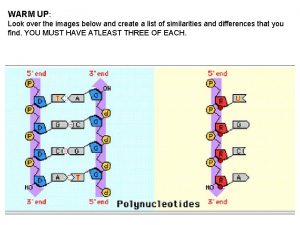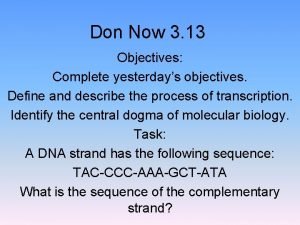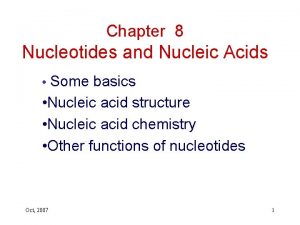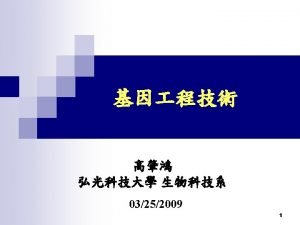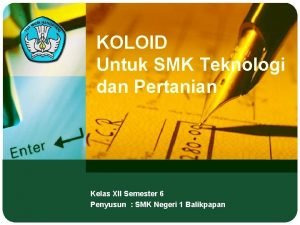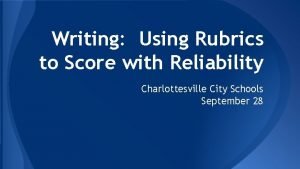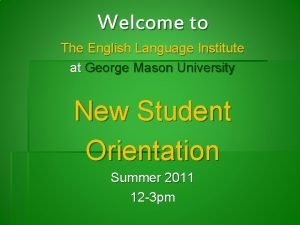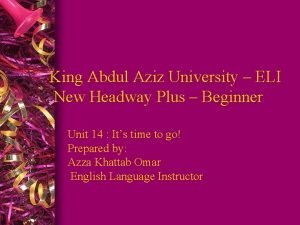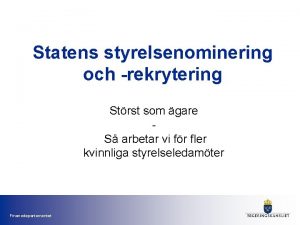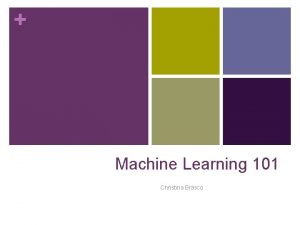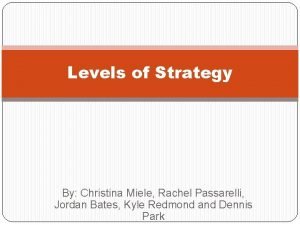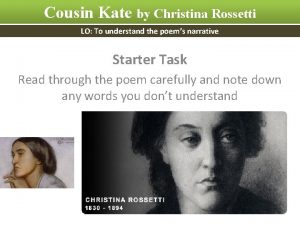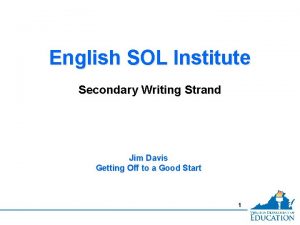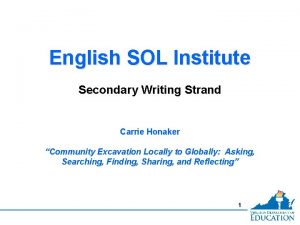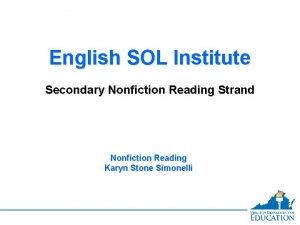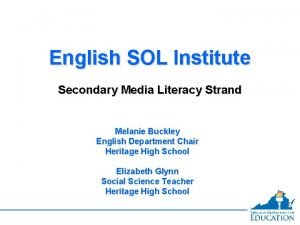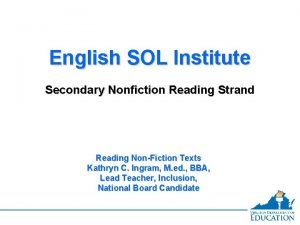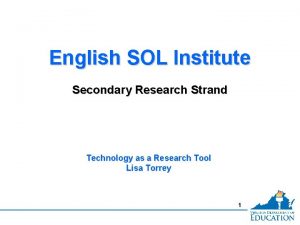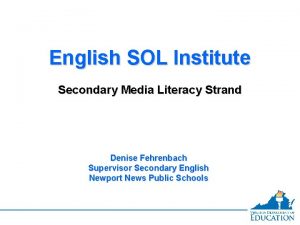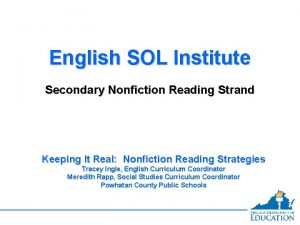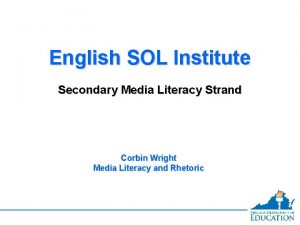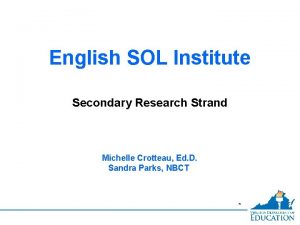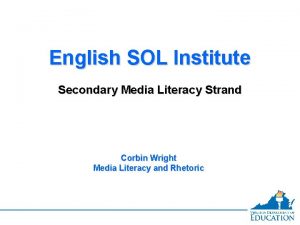English SOL Institute Secondary Writing Strand Christina Frierman




















- Slides: 20

English SOL Institute Secondary Writing Strand Christina Frierman 1

Secondary Writing Key Points in Secondary Writing • Writing revolves around mode, purpose, audience, and process • Provide students opportunities to practice writing on demand, for shorter time frames, and over extended periods of time • Each grade level has a composing/revision standard an editing/grammar standard 2

Secondary Writing Key Points in Secondary Writing • Teaching writing is an expectation of every grade, not only “tested” grades • Provide students with opportunities to compose using computers • Self- and peer-editing opportunities for students are essential 3

Secondary Writing Key Points in Secondary Writing • 6 -8 writing emphasis is expository and persuasive writing • 9 -12 writing emphasis is argumentative, persuasive, and analytical writing • 9 -12 writing should produce a sound argument, address counterclaims, provide sound reasoning, and come to a just conclusion

Secondary Writing Changes in SOL-Grade Level 9 Strand Description At the ninth-grade level, students will write narrative, expository, and persuasive forms with an emphasis on analysis. As in every grade, daily writing experiences are essential for all ninthgrade students, and they will demonstrate their understanding through written products. They will develop as writers by participating in a process for writing, including prewriting, organizing, composing, revising, editing, and publishing. Students will edit writings for correct grammar, capitalization, punctuation, spelling, sentence structure, and paragraphing. • Removed literary • Replaced informational with persuasive

Secondary Writing Target Objective 9. 6: The student will develop narrative, expository, and persuasive writings for a variety of audiences and purposes.

Secondary Writing SOL 9. 6 a) Generate, gather, and organize ideas for writing. b) Plan and organize writing to address a specific audience and purpose. c) Communicate clearly the purpose of the writing using a thesis statement where appropriate. d) Write clear, varied sentences using specific vocabulary and information. e) Elaborate ideas clearly through word choice and vivid description. f) Arrange paragraphs into a logical progression. g) Use transitions between paragraphs and ideas. h) Revise writing for clarity of content, accuracy, and depth of information. i) Use computer technology to plan, draft, revise, edit, and publish writing.

Secondary Writing Essential Understandings • Understand that writing is a process • Understand the importance of audience, purpose, and point of view when writing • Recognize the importance of maintaining a formal style and objective tone in academic writing • Understand that the function of a thesis statement is to focus on the purpose of the writing

Secondary Writing Essential Knowledge, Skills, and Processes • Use prewriting strategies and organize writing. • Plan and develop organized and focused written products that demonstrate their understanding of composing, written expression, and usage/mechanics and that reflect an appropriate audience and purpose. • Demonstrate the purpose of writing as narrative, persuasive, expository, or analytical. • Apply narrative techniques, such as dialogue, description, and pacing to develop experiences or characters. • Write using a clear, focused thesis that addresses the purpose for writing. • Provide an engaging introduction and clear thesis statement that introduces the information presented.

Secondary Writing Essential Knowledge, Skills, and Processes • Write clear, varied sentences, and increase the use of embedded clauses. • Use specific vocabulary and information • Use precise language to convey a vivid picture. • Develop the topic with appropriate information, details, and examples. • Arrange paragraphs into a logical progression using appropriate words or phrases to signal organizational pattern and transitions between ideas. • Revise writing for clarity, content, depth of information, and intended audience and purpose. • Use computer technology to assist in the writing process.

Secondary Writing A Writer’s Workshop Approach

Secondary Writing Writer’s Workshop: Lesson Objective The student will examine a sample essay for the major components of a written response. The student will then use this information as part of the writing process.

Secondary Writing Writer’s Workshop: Structure q Multi-day q Partner, Small Group, Individual q Multiple opportunities to explore, explain, employ, and reflect q Multiple writing prompts

Secondary Writing Writer’s Workshop: Procedures 1. Examination of a sample essay (Handout A) a. Identification of thesis, main ideas, supporting details b. Share in small groups c. Discuss as whole class

Secondary Writing Writer’s Workshop: Procedures 2. Guided Practice A (Writing Prompt 1 -Display A) a. Steps in planning and organizing • The question • Write a thesis statement • Plan supporting ideas • ROSE Strategy

Secondary Writing Writer’s Workshop: ROSE Strategy Readings Observations Studies Experiences

Secondary Writing Writer’s Workshop: Procedures 3. Guided Practice B (Writing Prompt 2 -Handout B) a. Working in pairs, complete previous procedures b. Individually, write essay c. Apply strategy from Handout A d. Complete Reflection

Secondary Writing Writer’s Workshop: Procedures 4. Independent Practice a. Writing Prompt 3 (Handout C) b. Complete all prior procedures

Contact Information Christina M. Frierman Tidewater Writing Project First Colonial High School City of Virginia Beach Public Schools Christina. Frierman@vbschools. com 19

Disclaimer Reference within this presentation to any specific commercial or non-commercial product, process, or service by trade name, trademark, manufacturer or otherwise does not constitute or imply an endorsement, recommendation, or favoring by the Virginia Department of Education. 20
 Dispersive model
Dispersive model Mrna strand that is complementary to the dna strand aattgc
Mrna strand that is complementary to the dna strand aattgc Template strand, new strand, base pair, and dna polymerase.
Template strand, new strand, base pair, and dna polymerase. Phosphoanhydride bond
Phosphoanhydride bond Watson strand crick strand
Watson strand crick strand Contoh koloid liofob
Contoh koloid liofob Score charlottesville
Score charlottesville Eli gmu
Eli gmu King abdulaziz university english language institute
King abdulaziz university english language institute English language teaching institute
English language teaching institute Christina ardito
Christina ardito Christina detter
Christina detter Christina ioannides
Christina ioannides Remember christina rossetti analysis
Remember christina rossetti analysis Christina brasco
Christina brasco Christina miele
Christina miele Christina tripodi mitchell
Christina tripodi mitchell Shake shack
Shake shack Christina rørbye
Christina rørbye Dr christina bradstreet
Dr christina bradstreet Cousin structure
Cousin structure

